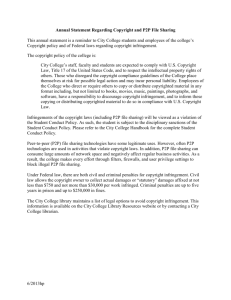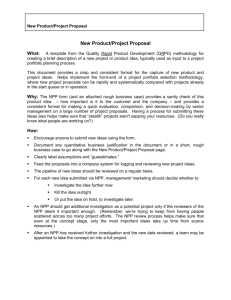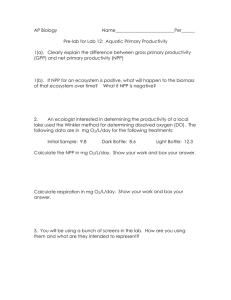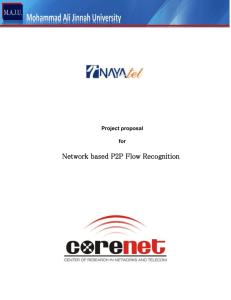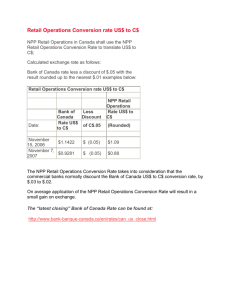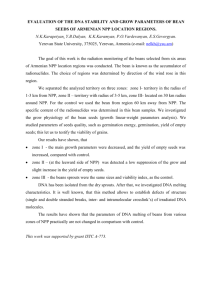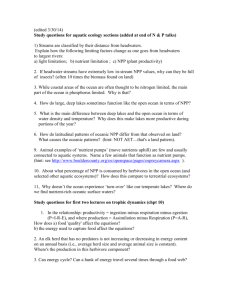P2P File Sharing: The Digital Dilemma
advertisement
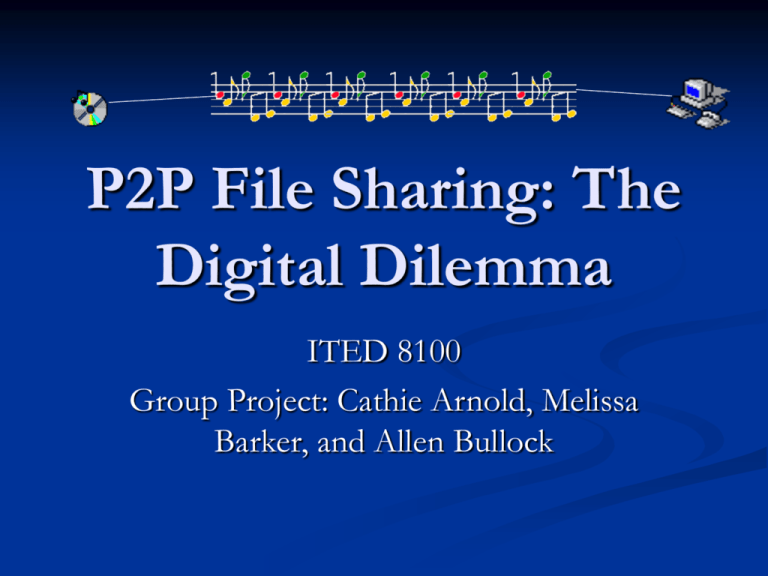
P2P File Sharing: The Digital Dilemma ITED 8100 Group Project: Cathie Arnold, Melissa Barker, and Allen Bullock Who are we? Our organization is a radio station conglomerate. We own many large and several small radio stations throughout the Southeastern United States. Our organization employs many radio personalities, technicians, and other personnel needed to run the radio stations. Upon being hired into our organization (whether at the corporate headquarters or at a small station) the Acceptable Use Policy is explained. Each employee receives a copy of the Acceptable Use Policy (AUP) and they sign the policy stating their understanding and acceptance of the policy. The Problem We received notice that a technology support employee at one of our small affiliate radio stations was cited for illegal file sharing. As the parent company, we could also be held liable for illegally downloading copyrighted materials. Upon an initial investigation, we discovered that music files had been shared through P2P file sharing web sites through the use of the radio stations network server. The Plan Our station management team has instructed us to create a committee to address this problem from a multitude of angles. We have decided to focus on the business, legal, and creative points of view at this time and since in this instance we are the end users, we will look at our point of view lastly. Legal Point of View The underlying question to the controversy of whether P2P file sharing is legal or not is held within the US copyright laws. Laws Copyright laws keep others from ‘copying’ original work and profiting from its sales. Contributory infringement laws are similar to the ‘aiding and abetting’ laws. One person can be held accountable for the actions of others. Penalties for infringement of copyright are most often civil remedies, this in laymen terms is money. Courts have stated… P2P websites can be held liable because… “one who, with knowledge of the infringing activity, induces, causes, or materially contributes to the infringing conduct of another, may be held liable as a contributory infringer.” (Court Rulings in Lohmann) P2P File Sharing Sites Believe they are not liable for how others use their software Believe they cannot control nor keep track of every file sharing incident Argue that their P2P file sharing system has legitimate purposes The Supreme Court found that the contributory infringement liability could not affect a manufacturer that produces a device that is “capable of substantial noninfringing use.” Business Point of View Music Industry / ‘Recording Companies’ Unable to invest in new talent due to monies lost because of P2P Payment to artists and creators has been reduced greatly due to P2P Receives about $7.50 per CD sale Music Stores (Online and Small Retail businesses) Online music stores have suffered monetary loss in sales due to the rampant use of P2P illegal file sharing Small retail stores have downsized or closed due to sales that are no longer made due to the availability of these items free through P2P networking Creators’ Point of View Creating and performing music and song This capability is both a gift and a talent. Creators typically want to share their gift/talent with others. Sharing their talent with others presents the opportunity to make money , which allows the ‘creator’ to focus their full attention on creating more music Creators’ Perspective Many ‘creators’ are unhappy with the current music industry. Despite the above, many creators do not agree with the current illegal use of P2P networking. Creators’ believe… They should have the right to maintain control of their music. They should have the right to be compensated for their efforts. Creators’ Dilemma Historically there has been only one method of getting their songs/music to the masses…by signing a contract with a record label, which then takes control of the music and develops a plan for marketing and distributing to the masses. Upon signing a record deal, the creator often gives up rights to the music, turning the copyright over to the record label The creator also loses rights to much of the profits produced from CD sales. Distribution of Music Unknown artists can post their music to soundclick..com or MP3.com in hopes of being discovered and selling music. Artists can now make their music available through P2P networks in hopes of creating a demand for their music and ultimately increasing sales. Much of P2P network sharing of music, however, is done without the consent of the creator or the copyright holder. P2P networks take away ‘distribution control’ from the creator. End User Point of View End Users believe that P2P file sharing is O.K. because: The P2P file sharing system promotes ‘new’ music. CD prices are too high. CD’s usually only have one or two songs the consumer wants. Much of the downloaded music is never played by ‘mainstream’ radio stations. Participants are not benefiting financially. End Users believe: musicians already make enough money from merchandise and concerts. P2P sharing is allowing them to take the power back from the record companies. The current controversy over P2P file sharing is the fault of the music industry for not adapting to new technology quick enough. The Solution Ultimately, because our radio station is a corporation…the legal point of view is all that matters. We are a company and must uphold the current United States copyright laws whether we believe them to be right or wrong. The Solution All copyrighted material will immediately be removed from company servers. The employee responsible for sharing the illegal material will be terminated. A committee will rewrite the company Acceptable Use Policy. The policy will be rewritten to specifically address the issue of P2P file sharing on company servers. Sources Animations: http://www.animationlibrary.com/al/?n=subcat_images.php3&id=32&start=60&end=20 (2003). Recording Industry Association of America. Retrieved Feb 26, 2004, from GetNetWise Web site: http://www.getnetwise.org/about/supporters/riaa Dean, K. (2003). Teaching music traders a lesson. Retrieved Feb 26, 2004, from Wired News Web site: http://www.wired.com/news/digiwood/0,1412,61173,00.html Dean, K. (2003). Upload a file, go to prison. Retrieved Feb 26, 2004, from Wired News Web site: http://www.wired.com/news/print/0,1294,59654,00.html Henley, D. (2004). Killing the music. Retrieved Feb 26, 2004, from commondreams.org Web site: http://www.commondreams.org/cgi-bin/print.cgi?file=/views04/0217-01.htm Koranteng, J. (2004). Online music:the legal alternatives take shape. Retrieved Feb 26, 2004, from pro-music.org Web site: http://www.pro-music.org/musiconline/Jkarticle.htm Lohmann, F. (2003). What peer to peer developers need to know about copyright law. Retrieved Feb. 27th, 2004, from Electronic Frontier Foundation web site: www.eff.org/IP/P2P/p2p_copyright_wp.php Mullarvey, J. (2003). Peer-to-peer file sharing: the legal landscape. Retrieved Feb 27th, 2004, from Australian Vice Chancellors’ Committee web site: www.avcc.edu.ac Rainsford, M. (2003). O'Reilly P2P. retrieved Feb 26, 2004, from openp2p.com Web site: http://www.openp2p.com/pub/a/p2p/2003/06/10/musician_pov.html. Scallions, B. (02). Musicians sound off on napster. retrieved Feb 27, 2004, from USA Today Web site: http://www.usatoday.com/tech/techreviews/napster-quotes.htm Wright, B. (2004). File share software developers want copyright reform. Retrieved Feb 26, 2004, from cnn.com Web site: http://cnn.technology.printthis.clickability.com/pt/cpt?action=cpt$title=CNN.com+-+File

